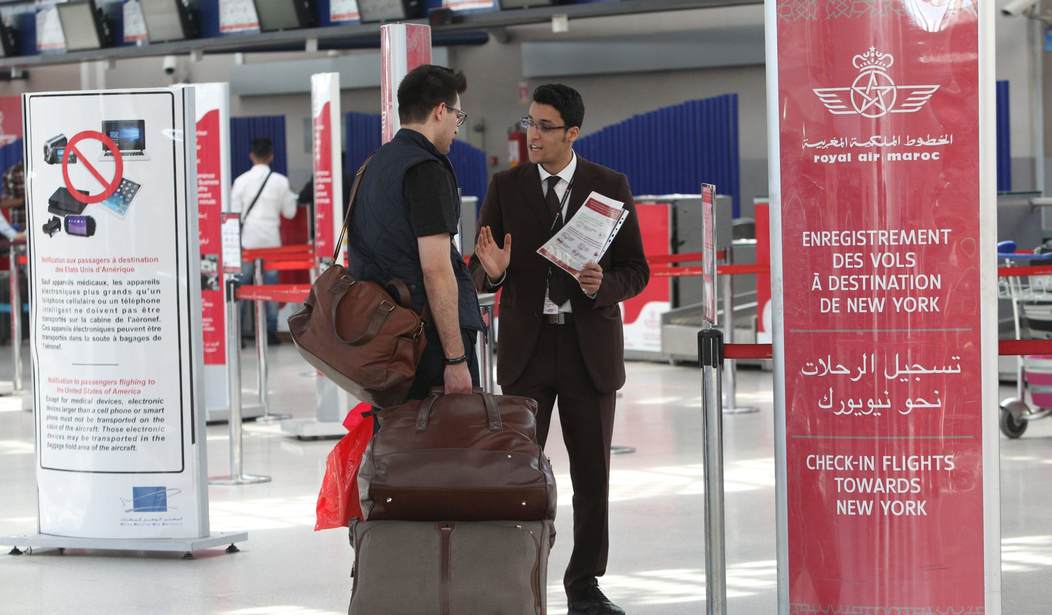WASHINGTON – Del. Eleanor Holmes Norton (D-D.C.) on Tuesday asked that the Transportation and Infrastructure Committee hold a hearing to discuss the fire threat of lithium batteries on airplanes and efforts to ban large electronic devices in carry-on bags.
The battery industry is now producing about 5 billion lithium batteries annually, and battery associations say that, thanks to manufacturing defects, 1 in 10 million of these batteries will spontaneously combust. Another concern with laptops is the threat that terrorists can use them to conceal explosive devices.
The Trump administration earlier this year banned electronic devices larger than cell phones in carry-on bags on commercial airplanes for flights from 10 airports in the Middle East and North Africa. The ban meant that the devices have to be stowed with checked luggage in cargo areas. There have been talks about broadening that ban to airports throughout Europe, but that has been tabled for the time being.
“We have all seen the videos of devices using lithium ion batteries burst into flames,” Norton said in a statement Tuesday. “Experts have pointed out that fires caused by lithium batteries are more easily detected within the cabin of an aircraft as opposed to within the cargo hold. We need to learn more about the threats electronics and lithium batteries pose on board aircraft, whether in carry-ons or stowed in checked luggage.”
Norton’s letter was sent to Transportation and Infrastructure Committee Chairman Bill Shuster (R-Pa.) and Ranking Member Peter DeFazio (D-Ore.).
John Cox, CEO of Safety Operating Systems and a former pilot, has been analyzing in-flight fire issues for the past 12 years, with a focus on lithium batteries for the past four. He said in an interview Wednesday that lithium batteries are no safer in the cargo area than they are in the cabin, an observation that suggests it might be best to ban lithium batteries altogether.
“But that has a lot of heavy duty social implications for people in business and others who depend on (laptops). So there are some very hard questions in here,” Cox said. “Think about it – where do you go in today’s world where there are not lithium batteries?”
Since 1991, there has been an exponential rise in lithium-battery fire incidents as mass production has exploded. In 2016, the Federal Aviation Administration reported 32 lithium-battery fire incidents on and around airplanes. Cox listed three incidents in aviation history in which lithium fires brought down planes, though one was able to land successfully: two UPS aircraft and one Asiana aircraft.
Damage and improper charging devices increase the risks for lithium battery fires. Once a battery cell exceeds 180 degrees Fahrenheit, the fire becomes self-sustaining, leading to pressure buildup in the cell and exposure of the contents inside the battery. The internal components consist of molten-copper wiring and a gel that can stick to skin like napalm. The substances are highly toxic, highly flammable and are difficult to put out even with traditional fire extinguishers.
Though the first lithium-ion battery was produced in the early 1990s, Cox said the issue has gained attention recently because of the sheer magnitude of production and inevitable high-profile incidents that have ensued.
“What this results in is even low-probability events, because you have so many of them in society, can then in fact present an aggregate number that’s unacceptably high,” he said, noting the .0001 percent combustion rate. “When you put (those statistics) into the billions of lithium battery cells that are out there, it means that we’re having a thousand or so of those events annually, and that’s a pretty high number.”









Join the conversation as a VIP Member